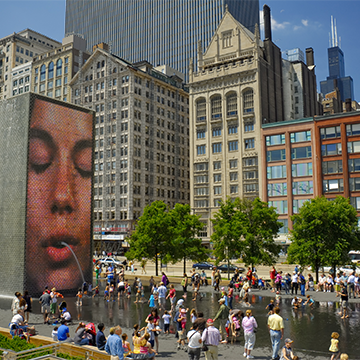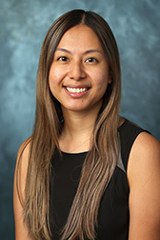Pediatric Allergy & Immunology Fellowship
The 2-3 year Pediatric Allergy & Immunology (A/I) Fellowship at the Feinberg School of Medicine leads to certification in Allergy and Immunology. In addition to inpatient and outpatient rotations at Ann & Robert H. Lurie Children's Hospital of Chicago, the A/I fellows rotate to Northwestern Memorial Hospital for four months of consultative inpatient and ambulatory cross-training. We accept one new fellow annually to the ACGME- accredited program.
The A/I Division at Lurie Children's is an active tertiary referral center that receives a large number of patients with rare and challenging diseases as well as a large number of patients with common allergic complaints. As a result, fellows in A/I have an outstanding opportunity to gain clinical management skills for both routine and unusual diseases. Our division has active clinical practices and research programs in many areas, but with particular focus in the areas of food allergy, asthma and immune deficiency.
Education
Our program follows the regulations of the ACGME and of our McGaw Medical Center Graduate Medical Education office. For the first two years, our program consists 50 percent of clinical activities, 25 percent of research activities and 25 percent of educational activities. These activities are supervised by our large faculty group, consisting of allergist-immunologists trained in either pediatrics or internal medicine. In addition, we collaborate with several other faculty in other divisions and at other Northwestern hospitals. The third year of the pediatric fellowship track is dedicated to research with continuation of the fellow’s weekly half-day continuity clinic.
Formal teaching programs include the Clinical Orientation Course (five weeks), the Laboratory Techniques Course (five weeks) and the Introductory Basic Immunology Course (15 weeks). In addition, through the year we have a weekly Allergy-Immunology Topics Course (CME accredited), Board Review course, Divisional Research Talks (internal speakers), Allergy-Immunology Research conferences (local, national and international speakers) and a twice-monthly journal club combined with the basic science faculty and students. All of these programs are held jointly with the adult division of A/I at Northwestern Memorial Hospital. In addition, our fellows attend the national meetings of the American Academy of Allergy, Asthma and Immunology, America College of Allergy, Asthma and Immunology, Clinical Immunology Society and the Allergy-Immunology Board Review Course, as well as the local meetings of the Illinois Society of Allergy, Asthma and Immunology. Our program provides travel support to attend these meetings beyond the society travel grants and purchases the following allergy-immunology books for fellows based on reaching performance milestones: Abbas, Lichtman, Pillai (eds) Basic Immunology. Grammer, Greenberger (eds), Patterson’s Allergic Diseases. Adkinson, Bochner. Busse, Holgate, Lemanske, Simons (eds), Middleton’s Allergy Principles and Practice.
Research
During the first two years, fellows spend 25 percent of their work in investigations in order to fulfill ACGME requirements. Thereafter, the fellow’s research effort increases to 90 percent. We have had several fellows pursue further graduate education, obtaining a Master in Science of Clinical Investigations during fellowship. Our program also features a National Institute of Allergy and Infectious Diseases–funded T32 training grant, the Northwestern University Allergy-Immunology Research Program, with additional opportunities for translational research. By graduation, fellows typically submit two or more publications, one or more original research articles and one review or book chapter. Our combined pediatric and adult faculty members publish about 60 papers per year.
Our faculty members conduct molecular, cellular, genetic, epidemiological and translational research as well as clinical trials and comparative effectiveness research. We have been funded by numerous grants from the NIH (R, U, T and F mechanisms), foundations, society and industry, as well as by private gifts. The research interests of our faculty members are detailed in our profiles on this site and within the Department of Medicine site. Our combined pediatric and adult program has 5,675 square feet of bench laboratory space equipped with cutting-edge instruments for molecular and cellular research. In addition, Northwestern University supports numerous research cores that provide basic and clinical research services. We conduct bench, translational and clinical research in asthma, chronic rhinosinusitis, food allergy, eosinophilic esophagitis, drug allergy, urticaria and primary immunodeficiency. Our molecular research programs include projects on mechanism of action of glucocorticoids, mast cell biology, leukocyte migration and eosinophil biology.
Clinical Experience
Clinical training primarily takes place at the Ann & Robert H. Lurie Children’s Hospital of Chicago (over 280 beds) with cross-training at Northwestern Memorial Hospital and Prentice Women’s Hospital. At Lurie Children’s, we care for allergic disorders such as food allergy, asthma, allergic rhinitis, urticaria and drug allergy. We are a Food Allergy Research & Education Clinical Network site and a Jeffrey Modell Foundation Diagnostic and Testing Center for Primary Immunodeficiency. The division sees hundreds of children with primary immunodeficiency and performs bone marrow transplantation for the most severe deficiencies in collaboration with the Hematology-Oncology service.
Our adult and pediatric allergy-immunology services account for over 17,000 outpatient visits and 1,200 inpatient visits per year. The extensive outpatient and inpatient clinical training of our program is recognized nationwide. Our fellows are sought after by recruiting practices and academic centers and often become local leaders, providing advice on management of patients to other allergists and immunologists in the community.
Requirements & Eligibility
Fellowship applicants must complete an ACGME-approved residency in Pediatrics or Med-Peds before entering our program. Applications are reviewed in ERAS and acceptance is via NRMP. Please review the eligibility requirements for certification by the American Board of Allergy and Immunology.
Application Process
We receive applications through the Electronic Residency Application Service for fellowships (ACGME ID#0201631016) every year from July 1 to Sept. 15.
Application consists of:
- The ERAS application form
- Curriculum vitae
- Three or more letters of reference, including one from the residency program director
- Personal statement
- Medical school performance evaluation or transcript
- USMLE transcript
- ECFMG status report, if applicable
After interviews (August-September), we accept applicants via the National Resident Matching Program site. Our pediatric track code is 2247020F1. Match results are published in early December.
Advocacy
Discover the many ways our faculty are impacting children's health beyond the hospital.
Global Health
Each year, as many as 20 third-year pediatric residents travel to Bugando Medical Center in Mwanza, Tanzania, to participate in an educational initiative that provides exposure to the management of complex pediatric diseases in a low-resource setting. Learn more about this extraordinary opportunity.
Why Northwestern?
 Housestaff training through McGaw Medical Center of Northwestern University provides diverse and challenging clinical experiences and world-class education located in the heart of the beautiful city of Chicago.
Housestaff training through McGaw Medical Center of Northwestern University provides diverse and challenging clinical experiences and world-class education located in the heart of the beautiful city of Chicago.
Watch Our Videos
Fellowship Life
Contact Us
Aisha Ahmed, MD
Fellowship Director, Pediatric Allergy & Immunology (A/I) Fellowship
Allergy and Immunology

Pa Zao Lee
Medical Education Coordinator
Allergy and Immunology, Dermatology, Rheumatology
phone 312-227-1107; fax 312-227-9402
More Information
Further program details, including the housestaff manual and a sample training contract, are available on the McGaw Medical Center of Northwestern University site.
Physician-Scientist Training & Resources
We offer a wide range of resources, mentorship opportunities and formal training programs to help our residents and fellows excel as physician-scientists. Explore all of the resources and hear from housestaff who are making research a major part of their career development plans.